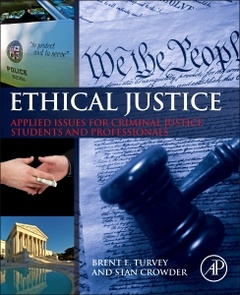Ethical Justice Applied Issues for Criminal Justice Students and Professionals
Auteurs : Turvey Brent E., Crowder Stan

1. An Introduction to Ethics
PART I. ACADEMIA
2. Ethical Issues for Criminal Justice Students
3. Criminal Justice Educators: Ethical Issues in Teaching
4. Criminology Research: Ethical Issues in Theory Testing and Publishing
PART II. LAW ENFORCEMENT
6. Ethical Issues in Policing
7. Ethical Issues in Criminal Investigation
8. Profiles in Police Misconduct and Crime
PART III. FORENSIC SERVICES
9. Ethical Issues in the Crime Lab
10. Ethical Issues in Forensic Examination
11. Forensic Fraud
PART IV. THE COURTS
12. Ethical Issues for Criminal Prosecutors
13. Ethical Issues for Criminal Defense Attorneys
14. Ethical Issues in the Judiciary
PART V. CORRECTIONS
15. Ethical Issues for Corrections Staff
16. Ethical Issues for Treatment Staff in Correctional Settings
PART VI. PROFESSIONAL ETHICS
17. Ethical Professional Conduct
18. The Professional Resume: Ethical Considerations
19. The Role of Professional Organizations in Criminal Justice
Glossary
Primary: Forensic scientists, students and instructors in forensic science and criminology
Brent E. Turvey spent his first years in college on a pre-med track only to change his course of study once his true interests took hold. He received a Bachelor of Science degree from Portland State University in Psychology, with an emphasis on Forensic Psychology, and an additional Bachelor of Science degree in History. He went on to receive his Masters of Science in Forensic Science after studying at the University of New Haven, in West Haven, Connecticut.
Since graduating in 1996, Brent has consulted with many agencies, attorneys, and police departments in the United States, Australia, China, Canada, Barbados and Korea on a range of rapes, homicides, and serial/ multiple rape/ death cases, as a forensic scientist and criminal profiler. He has also been court qualified as an expert in the areas of criminal profiling, forensic science, victimology, and crime reconstruction. In August of 2002, he was invited by the Chinese People's Police Security University (CPPSU) in Beijing to lecture before groups of detectives at the Beijing, Wuhan, Hanzou, and Shanghai police bureaus. In 2005, he was invited back to China again, to lecture at the CPPSU, and to the police in Beijing and Xian - after the translation of the 2nd edition of his text into Chinese for the University. In 2007, he was invited to lecture at the 1st Behavioral Sciences Conference at the Home Team (Police) Academy in Singapore, where he also provided training to their Behavioral Science Unit. In 2012 Brent completed his PhD in Criminology from Bond University in Gold Coast, Australia.
He is the author of Criminal Profiling: An Introduction to Behavioral Evidence Analysis, 1st, 2nd, 3rd and 4th Editions (1999, 2002, 2008, 2011); co- author of the Rape Investigation Handbook, 1st and 2nd Editions (2004, 2011), Crime Reconstruction 1st and 2nd Editions (2006, 2011), Forensic Victimology (2008) and Forensic Fraud (2013) - all with Elsevier Science. He is currently a full partner, Forensic Scie
- First of its kind overview of the five pillars of criminal justice: academia, law enforcement, forensic services, courts and corrections
- Written by practicing criminal justice professionals, from across every pillar
- Offers a realistic overview of ethical issues confronted by criminals justice students and professionals
- Examines sensitive subjects often ignored in other criminal justice ethics texts
- Numerous cases examples in each chapter to facilitate instruction and learning
Date de parution : 08-2013
Ouvrage de 496 p.
19x23.3 cm
Thèmes d’Ethical Justice :
Mots-clés :
Academia; Academic misconduct; Administrative investigations; Admissibility; Adversarial system; Appointed counsel; Attorney-client privilege; Bias; Brady v; Maryland; Capability; Cheating; Circular reasoning; City/Municipal Attorneys; Code of Silence (a.k.a; Blue Wall of Silence); Coercion; Compassion fatigue; Competence; Competency to stand trial evaluations; Conduct unbecoming; Confession; Conflict of interest; Consent; Contingency fee agreements; Contraband; Correctional officers; Corrections; Credential mill; Criminal defense attorney; Criminal justice system; Criminal responsibility evaluations; Date and information fabrication; Direct plagiarism; Dissemblers; District Attorneys (DAs); Doyle Error; Dual agency; Due process; Duty of care; Embroilment; Enforcement-oriented policing; Entrapment; Evidence; False confession; Falsification; Forensic examiner; Forensic expert; Garrity Rule; General knowledge exam; Ghost authorship; Inculpatory statement; Ineffective assistance of counsel; Intelligence-oriented policing; Law enforcement; Logical fallacies; Malingering; Mandatory arrest laws; Mere suspicion; NAS Report; Noble cause corruption; Overgeneralization; Patrol officers; Practice standards; Professional certification; Professional organization; Quality control; Racial profiling; Reasonable suspicion; Scholarship; Scientific integrity; Scientist; Search and seizure laws; Selective enforcement; Whistleblower; Whistleblower Protection Enhancement Act of 2012



